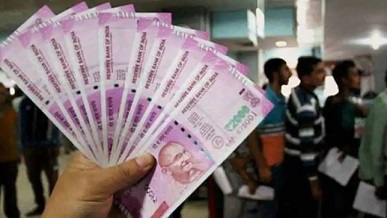By Our Correspondent
NEW DELHI: The Union Finance Ministry issued Clarification on doubts arising on account of new TCS provisions.There are reports in certain sections of media wherein certain doubts have been raised regarding the applicability of the provisions relating to Tax Collection at Source (TCS) on certain goods introduced vide Finance Act, 2020. This press note is being issued to clarify those doubts about the applicability of these provisions.
Finance Act, 2020 amended provisions relating to TCS with effect from 1st October, 2020 to provide that seller of goods shall collect tax @ 0.1 per cent (0.075% up to 31.03.2021) if the receipt of sale consideration from a buyer exceeds Rs. 50 lakh in the financial year. Further, to reduce the compliance burden, it has been provided that a seller would be required to collect tax only if his turnover exceeds Rs. 10 crore in the last financial year. Moreover, the export of goods has also been exempted from the applicability of these provisions.
It has been reported in the media that TCS has been made applicable to the amount received before 1st October, 2020. It is clarified that this report is not correct. In this connection, it may be noted that this TCS shall be applicable only on the amount received on or after 1st October, 2020. For example, a seller who has received Rs. 1 crore before 1st October, 2020 from a particular buyer and receives Rs. 5 lakh after 1st October, 2020 would be required to collect tax on Rs. 5 lakh only and not on Rs. 55 lakh [i.e Rs.1.05 crore – Rs. 50 lakh (threshold)] by including the amount received before 1st October, 2020.
It has also been reported in certain section of the media that every transaction will attract this TCS. This report is not correct. It may be noted that this TCS applies only in cases where receipt of sale consideration exceeds Rs. 50 lakh in a financial year. As the threshold is based on the yearly receipt, it may be noted that only for the purpose of calculation of this threshold of Rs. 50 lakh, the receipt from the beginning of the financial year i.e. from 1st April, 2020 shall be taken into account. For example, in the above illustration, the seller has to collect tax on receipt of Rs. 5 lakh after 1st October, 2020 because the receipts from 1st April, 2020 i.e. Rs. 1.05 crore exceeded the specified threshold of Rs. 50 lakh.
Further, the seller in most of the cases maintains running account of the buyer in which payments are generally not linked with a particular sale invoice. Therefore, in order to simplify and ease the compliance of the collector, it may be noted that this TCS provision shall be applicable on the amount of all sale consideration received on or after 1st October, 2020 without making any adjustment for the amount received in respect of sales made before 1st October, 2020. Mandating the collector to identify and exclude the amount in respect of sales made up to 30th September, 2020 from the amount received on or after the 1st of October, 2020 would have resulted into undue compliance burden for the collector and also litigation.
It has been reported in certain section of the media that this TCS is an additional tax. This is obviously not correct. In this regard, it may be noted that TCS is not an additional tax but is in the nature of advance income-tax/TDS for which the buyer would get the credit against his actual income tax liability and if the amount of TCS is more than his tax liability, the buyer would be entitled for refund of the excess amount along with interest.
It may also be noted that this TCS shall be applicable only on the receipt exceeding Rs. 50 lakh by a seller from a particular buyer. Therefore, on payment of Rs. 1 crore made by a buyer to a particular seller only Rs.5,000 (Rs. 3,750 this year) i.e. [0.1% of (Rs. 1 crore – Rs. 50 lakh)] shall be collected. Hence, in case of a person making payment of Rs.1 crore each to 10 different sellers, the total tax collected shall be only Rs.50,000 (Rs. 37,500 this year) i.e 10 x [0.1% of (Rs. 1 crore- Rs. 50 lakh)] on the total payment made for purchase of Rs. 10 crore to ten different sellers.
Assuming a net profit of 8% on sales, his business income in respect of this payment of Rs. 10 crore made for purchase would be around Rs. 87 lakh. The income-tax liability on the income of Rs. 87 lakh for an individual in the new taxation regime would be around Rs. 27 lakh. Hence, the amount of TCS collected i.e. Rs.50,000 (Rs. 37,500 this year) would be a miniscule part of his actual tax liability and would be easily adjusted against his tax liability. In a rare case, if his tax liability is less than even Rs.50,000 (Rs. 37,500 this year), he shall be entitled for refund of excess TCS with interest.
It has also been reported in certain section of media that every seller will have to collect TCS. This is also not correct. In this context, it may be noted that in order to reduce the compliance burden, this TCS is made applicable to only those sellers whose business turnover exceeds Rs. 10 crore. In other words, those having turnover of less than Rs. 10 crore will not be required to collect TCS. There are only around 3.5 lakh persons who have disclosed business turnover of more than Rs. 10 crore in FY 2018-19. There are around 18 lakh entities which already deal with TDS/TCS. Therefore, this TCS collection under these new provisions would be required to be made by persons who, in most of the cases, would already be complying with the other provisions of TDS/TCS.






























